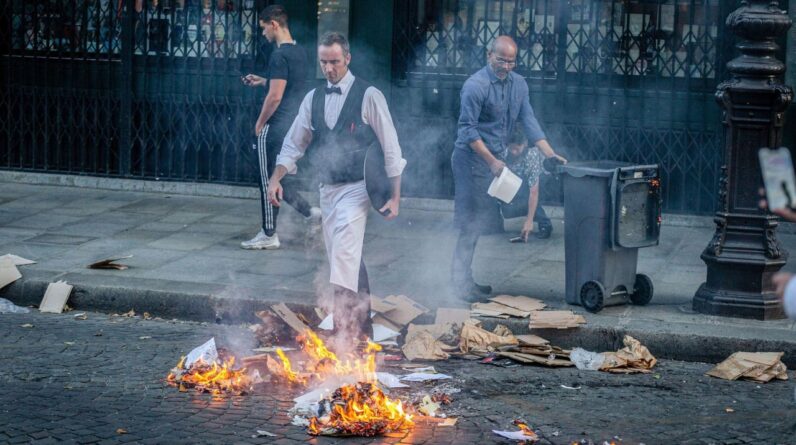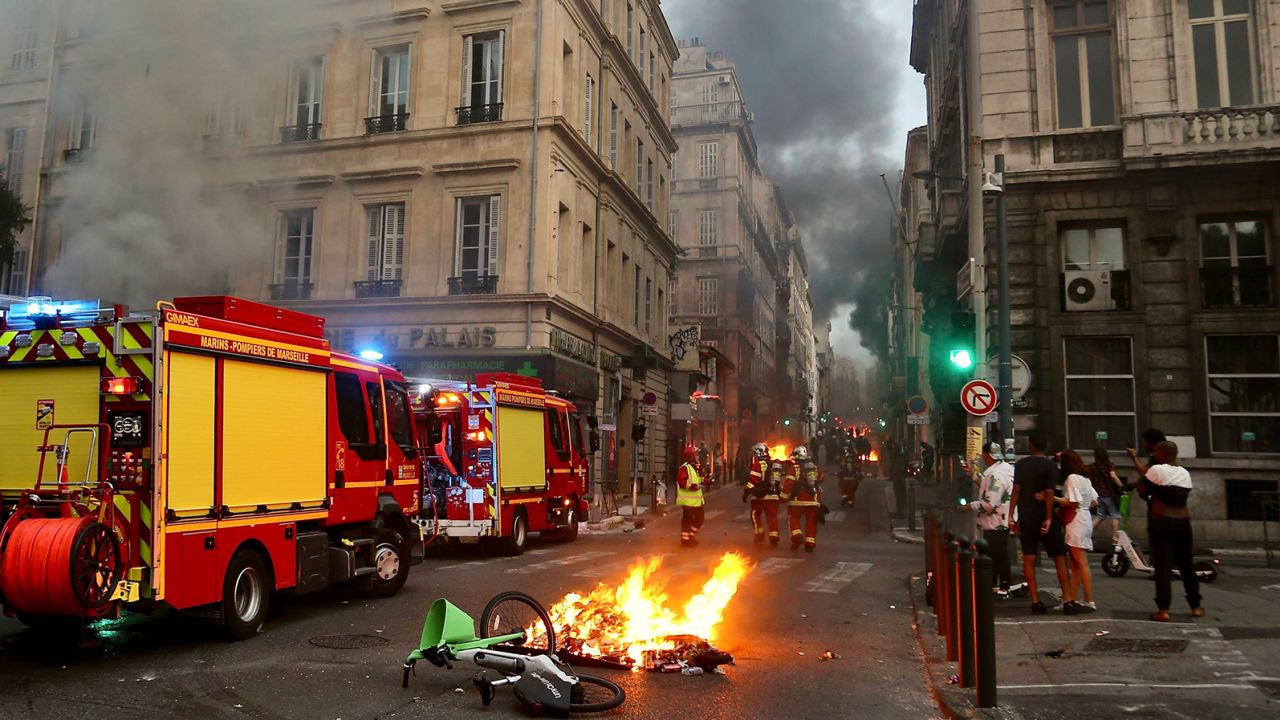
CNN
—
After a police officer in France shot and killed an unarmed 17-year-old Nahel Merzouk during a traffic stop in Paris last week, two fundraisers were organized. One, to support the teenager’s mother. The other, for the family of the policeman who shot him.
As of Tuesday afternoon, fundraising for the police officer had topped 1.5 million euros ($1.6 million), while Nahel’s had raised just over 380,000 euros ($414,000 ). More than 78,000 people had donated to support the police officer, while just over 20,000 had donated to support Nahel.
What explains this divergence? And what does it tell us about French politics?
The fundraiser for the police officer, who has been charged with voluntary manslaughter, was set up by French media personality and ex-politician Jean Messiha.
Having previously run as a candidate for the National Rally – the far-right party led by Marine Le Pen – Messiha later worked as a spokesman for the party of Eric Zemmour, another far-right candidate right in last year’s presidential election, whose platform was more extreme. that of Le Pen.
French lawmakers have criticized the fundraising and questioned the organizers’ motives.
“Everyone can express their feelings and contribute to a fund… But I think, in this case, it’s not going in the direction of calm,” Justice Minister Eric Dupond-Moretti said Monday in an interview with France Inter.
“I wonder if behind all this there is not an instrumentalization (of the murder),” he added.
Despite the criticism, the host website GoFundMe has refused to remove the campaign.
“This fund currently meets our terms of use because the funds will be paid directly to the family in question. The family has been added as a beneficiary and therefore the money will be paid directly to them,” a GoFundMe spokesperson told CNN affiliate BFMTV.
On Tuesday evening, Messiha announced on Twitter that the fundraiser would close at midnight local time (6:00 p.m. ET), but urged his supporters to continue the “national momentum” the campaign had generated.
The killing of Nahel, who was of Algerian descent, and the riots that followed his death, sparked a “typical and traditional far-right” reaction, according to Philippe Marliere, a professor of French politics at the University College of London
Many far-right supporters took the protests as proof that the rioters “don’t respect France, they hate it, they don’t want to integrate, they’re fools”, and as another example of how “French multiculturalism has failed”. . Marliere told CNN.
But while that rhetoric proliferated online, the fundraiser itself used more measured language.
“Support to the family of Nanterre police officer Florian.M who did his job and is now paying a high price. Give it MASSIVE credit to him and our police forces!” was read
This language “is designed to appeal to a much wider audience than typical far-right voters. This kind of statement could appeal to most French people, and most of them would never contemplate voting for the national rally,” Marliere said. So the fundraiser is helping to bring far-right politics into the mainstream, he added.
Le Pen also tempered her rhetoric in response to that crisis, in what Marliere said was an attempt to appeal to more middle-of-the-road voters. Instead of using the traditional far-right rallying calls of “riots, ethnic minorities, rebellion against public authority, the police, burning down public buildings” and more, he has adopted a more moderate tone than in the past , and much more than Zemmour.
While Zemmour called the rioters “scum” and called for some of their applications for French citizenship to be rejected, Le Pen spoke more sympathetically of the victim. “The death of a 17-year-old cannot leave anyone indifferent,” he said in a tweet.
According to Marliere, Le Pen’s “over the top” response to the crisis is part of a “long-term strategy not to appear as a far-right politician, but as someone who eventually – in four years’ time – could be seen as a credible replacement for Macron.”
Since Le Pen lost the presidential election to Emmanuel Macron in 2022, French politics has become increasingly conflicted. Macron faced huge protests in March and April over his controversial pension reforms, and there is a sense that he has struggled to regain his domestic position since then.
Many have pointed out that Le Pen’s decision to temper her rhetoric echoes that of Italian Prime Minister Georgia Meloni. Both politicians, trying to give their far-right parties a gloss of electability, have used a more moderate tone to appeal to the mainstream.
“Meloni’s strategy is very much what Le Pen is trying to follow in France,” Marliere said.
“This is politics: you instrumentalize a political event, a tragic political and social event, and try to score political points.”
But for the message to resonate, it must be based on the audience’s experience.
Joseph Downing, a senior lecturer in politics and international relations who has lived in Marseille for more than a decade, says he has witnessed the decline of security in the city, which has left entire areas virtually unchecked.
According to Downing, the successful fundraising for the police officer shows “the key reason why Le Pen, and to a lesser extent Zemmour, were successful in the presidential election campaign, because they talked about security “.
“If you talk to people on the ground, they constantly complain about the deterioration of security in French cities. That’s been something that’s been going on for the last few decades,” Downing told CNN.
In some areas of France, the police simply “don’t exist,” he said. In their place, gangs armed with Kalashnikovs have been able to proliferate.
“Nanterre (the Paris suburb where Nahel was killed) is a good example of this. The police themselves are afraid. And the police know that in Nanterre, in Clichy-sous-Bois, in the northern districts of Marseille, there armed people. And there are people who are armed with bigger guns than what they have,” Downing said.

While the absence of police is felt most keenly in Marseille, Downing says the sense of insecurity has begun to seep into Paris.
“On the minds of French voters, and unfortunately not being addressed by the mainstream, is the issue of banal, everyday insecurity,” Downing said.
He believes the police officer’s fundraiser reveals some of those feelings of insecurity. The riots that rocked several French cities were a brief outburst of anxiety whose peak has passed, according to comments made by Macron on Tuesday. But fundraising was growing at a rapid pace before Messahi’s announcement, amassing more than €500,000 (€545,000) as of Monday afternoon.
The difference between the two fundraisers also shows the different levels of organization in the French political spectrum. Those who took to the streets to protest police violence “might use Snapchat, but they wouldn’t be aware of a GoFundMe,” Downing said. Meanwhile, the cause of the order has appealed to the “more committed” right. “The right is much more mobilized and much richer in general in France,” he said.
After facing two huge waves of protests this year, Macron has been weakened. Although the nature of the two crises was very different, both have contributed to the growing image of a president out of touch with his people, who is more comfortable in front of a global audience than a domestic one.
“It’s easier to be on the international stage than to try to solve very complex and intractable problems at home,” Downing told CNN.
[ad_2]
Source link





